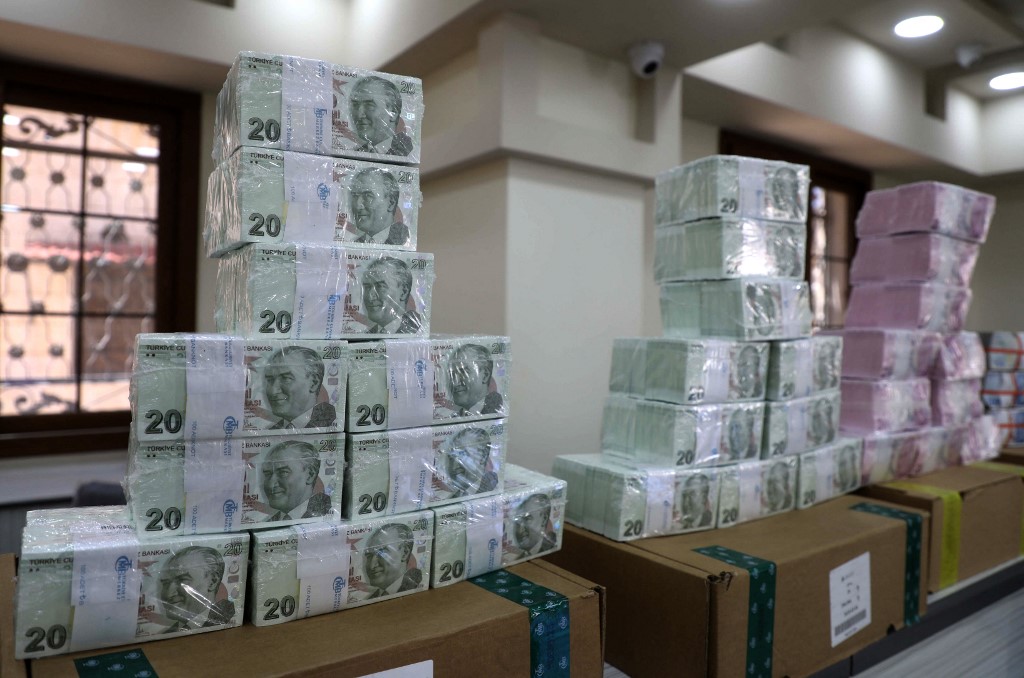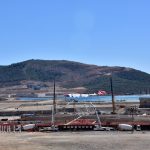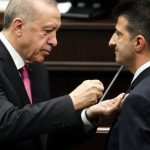An influx of suspicious money has helped the Turkish economy boost its foreign reserves, according to reports by Bloomberg and the Financial Times last month, and this unexplained cash is financing two-thirds of the current account gap. Turkish President Recep Tayyip Erdoğan’s ruling Justice and Development Party (AKP) is transferring mystery funds from abroad into the Turkish economy, and they have also called on Turkish businesspeople to bring their undisclosed money abroad back into the country. Turkey’s current account deficit continues to widen, and the Erdoğan government will continue to bring suspicious funds into the country in the hope of turning the wheels of the economy.
Turkey’s “wealth amnesty” law allows individuals and companies to repatriate previously undisclosed offshore assets and to declare previously undisclosed domestic assets. The first amnesty became effective in November 2008 and ran to the end of 2009. Erdoğan issued a decree on Dec. 31 2021, extending the country’s wealth amnesty law until March 31, 2023. This decree was the eighth such amnesty that Erdoğan has declared since 2008.
Turkey is in the midst of a serious economic crisis, and data from the Turkish Statistical Institute show that Turkey’s foreign trade deficit increased by 159.9 percent year-on-year to $11.19 billion in August, with imports surging 40.4 percent and annual inflation climbing to a new 24-year-high of 83.45 percent in September.
The Financial Times article, titled “Who’s stuffing Turkey?” and published on Sept. 13, sheds light on how Turkey received $24.4 billion more than it could explain from abroad in the first seven months of this year. Al-Monitor also reported that such inflows of unknown origin have increased since Erdoğan assumed sweeping executive powers in 2018 under a presidential system of governance and that in the four and a half years from 2018 through the first half of 2022, an influx of cash from unknown sources became the main means of financing a current account deficit totaling some $98 billion.
Former finance minister and main opposition Republican People’s Party (CHP) deputy Abdüllatif Şener accused the AKP of using Turkey as a center for money laundering since 2009. According to the Sözcü newspaper, Şener accused Erdoğan of running the Turkish economy with black money. CHP leader Kemal Kılıçdaroğlu has for many years been saying that Turkey has become the “money laundering center of Europe.” Erdoğan managed to cover up corruption investigations that became public Dec. 17-25, 2013, which implicated his inner circle and the infamous Turkish-Iranian money launderer Reza Zarrab together with some AKP ministers’ sons. The international media reported at the time on how Erdoğan helped Iran evade US sanctions.
Zarrab fled Turkey and was arrested at the Miami airport in March 2016 on charges of bank fraud, money laundering and helping the Iranian government evade US sanctions. The US Department of Justice announced on Oct. 15, 2019 that “TÜRKİYE HALK BANKASI A.S., aka “Halkbank,” was charged today in a six-count indictment with fraud, money laundering, and sanctions offenses related to the bank’s participation in a multibillion-dollar scheme to evade U.S. sanctions on Iran.”
The Erdoğan government was also warned regarding its Venezuela gold trade after the Turkish government denounced US sanctions on Venezuela. The US and the European Union have been imposing sanctions on Venezuela for many years in response to Venezuela’s lack of cooperation in counterterrorism and to ensure that Venezuelan President Nicolás Maduro and his team don’t profit from illegal gold mining and oil exports. The BBC reported that Western diplomatic sources accused Turkey of transferring Venezuela’s gold to Iran, which would violate US sanctions on these countries. Bloomberg reported that a mysterious Turkish firm helped Maduro move $900 million in gold. Turkey joined Russia, Iran and China in backing Maduro, and Erdoğan’s government has been buying oil from Venezuela since US sanctions prevent Maduro’s government from selling oil to the United States.
The Greek City Times reported in May that Turkey holds a leading position within the region on the transit routes of narcotic substances from Latin America. The newspaper discussed how Mehmet Ağar, a former justice and interior minister, together with Erkam Yıldırım, the son of Turkey’s former prime minister Binali Yıldırım, controls drug trafficking. “Due to the need of covering up logistic routes to transport drugs, Turkish businessman [Erkam] Yıldırım, under cover of a business activity, went to Venezuela three times in 2021 to sign contracts for Venezuelan dairy products – with the destination port being Yalıkavak,” the Greek City Times said.
Yalıkavak is a Turkish town located on the Aegean Sea.
Following these irregular financial activities, the Paris-based Financial Action Task Force (FATF), an international watchdog set up by the G-7 in July 1989, placed Turkey on the “grey list” over money laundering and terrorist financing in October of last year. A report by the FATF in December 2019 highlighted that Turkey had a low rate of conviction for terrorism financing since Turkish authorities prosecuted more than 6,000 people in 2017, but only 115 were convicted. FATF President Marcus Pleyer told the media at the time that “Turkey needs to show it is effectively tackling complex money laundering cases and show it is pursuing terrorist financing prosecutions … and prioritizing cases of UN- designated terrorist organizations such as ISIL and al Qaeda.”
Turkey now faces accusations of violating sanctions on Russia, but veteran Turkish journalist Ahmet Nesin accused Bilal Erdoğan, the president’s son, of laundering Russian money as Turkey refused to join in Western countries’ sanctions on Russia and because there has been an increase in Russian oligarchs settling in Turkey. Erdoğan’s son was investigated for money laundering in Italy in 2016 and admitted on national TV that he left Italy due to the money laundering allegations. However, Italian prosecutors were forced to drop the case against him since Hakan Uzan, the Turkish businessman responsible for filing the criminal complaint against Bilal Erdoğan, failed to appear in court to testify in early 2017.
The irony is that Turkey joined the FAFT in 1991, just two years after its establishment but has continued to receive billions of dollars in black money since then. Due to the fact that the FATF requires each member state to establish a “Financial Intelligence Unit” in order to combat money laundering and terrorism financing, Turkey established the Financial Crimes Investigation Board (MASAK) in 1996.
Turkish Interior Minister Süleyman Soylu, who has been pictured on numerous occasions alongside notorious criminals including rapists, drug dealers and mafia bosses, on Monday ordered the arrest of more than 600 Gülen movement members who provided assistance to the victims of Turkey’s ongoing purge. Erdoğan accuses the faith-based group of orchestrating a July 15, 2016 coup attempt, although the movement denies any involvement. Erdoğan declared a state of emergency following the failed coup and has been targeting members of the movement, including teachers, judges and academics along with the family members of suspected Gülenists.
Soylu mentioned that the operation was the culmination of investigative work jointly carried out over a period of eight months by the Anti-Smuggling and Organized Crime Unit and the counterterrorism and intelligence departments of the Security Directorate General, the pro-government Daily Sabah reported.
MASAK is, however, no longer investigating the billions of dollars entering Turkey but is instead choosing to focus its attention and resources on stalking and arresting hundreds of Gülen movement members who donated basic food items and a few hundred dollars to those families that were the victims of Erdoğan’s post-coup purges.
By: Türkmen Terzi
Source. Turkish Minute



